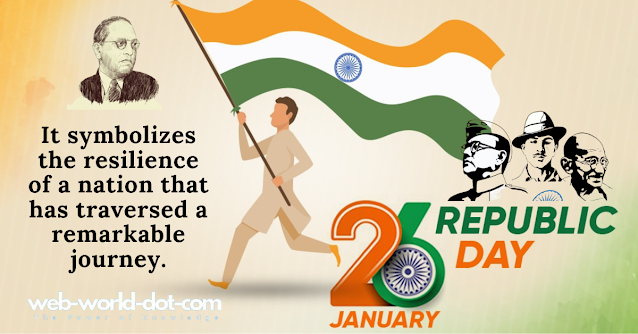Republic Day in India: A Tapestry Woven with History and Significance
As the sun rises on the 26th of January each year, India dons the vibrant hues of patriotism to celebrate its Republic Day. This significant occasion, marked by grand parades, cultural festivities, and the unfurling of the national flag, is not merely a date on the calendar but a poignant reminder of India's journey towards becoming a sovereign, socialist, secular, and democratic republic.
Republic Day's Historical Genesis
The genesis of Republic Day can be traced back to a pivotal moment in India's struggle for independence. On this day in 1930, the Indian National Congress declared Purna Swaraj, asserting complete independence from British rule. The 26th of January was chosen as it marked the anniversary of the declaration, and it became a symbol of India's aspirations for self-governance.
Constitutional Milestone: 1950
The true significance of Republic Day unfolded on the 26th of January 1950, when the Constitution of India came into effect, replacing the Government of India Act (1935). Dr. B.R. Ambedkar, the chief architect of the Indian Constitution, led the drafting committee, meticulously crafting a document that would serve as the guiding force for the world's largest democracy.
Symbolism of the Republic Day Parade
The grandeur of the Republic Day parade is etched in the hearts of every Indian. The ceremonial procession along Rajpath in New Delhi is a visual spectacle that symbolizes the strength, diversity, and unity of the nation. The military precision, cultural displays, and state tableaus narrate a story of India's rich heritage and its commitment to democratic values.
Inclusive Celebrations Across the Nation
While the capital witnesses the grandest celebrations, the spirit of Republic Day resonates in every nook and corner of the country. Schools, government offices, and communities come together to hoist the national flag, sing the national anthem, and partake in cultural activities. It is a day that unites the diverse tapestry of India in a shared celebration of nationhood.
Reflection on Democratic Ideals
Republic Day is not merely a day of festivities; it is an occasion for introspection. It prompts citizens to reflect on the democratic ideals enshrined in the constitution – justice, liberty, equality, and fraternity. It serves as a reminder of the responsibilities that come with the privilege of living in a democratic society.
Global Significance of Republic Day
Beyond India's borders, Republic Day holds global significance. The diplomatic community participates in the celebrations, emphasizing India's commitment to democratic principles. Indian diaspora worldwide joins in, creating a global chorus of patriotism and pride in the nation's achievements since attaining republic status.
Cultural Diversity on Display
The cultural diversity of India takes center stage during Republic Day celebrations. State tableaus showcase the unique traditions, art, and heritage of different regions, fostering a sense of pride in the nation's pluralistic identity. It is a day when diversity becomes a source of strength and unity.
Conclusion:
In conclusion, Republic Day in India is a celebration of historical milestones and a reiteration of democratic values. As the tricolor flutters in the wind and the national anthem echoes through the air, it symbolizes the resilience of a nation that has traversed a remarkable journey. Beyond the festivities, Republic Day serves as a powerful reminder that the ideals embedded in the constitution are the bedrock of India's identity and progress. This day invites every citizen to participate actively in shaping the nation's destiny, embodying the true spirit of a democratic republic.





No comments:
Post a Comment